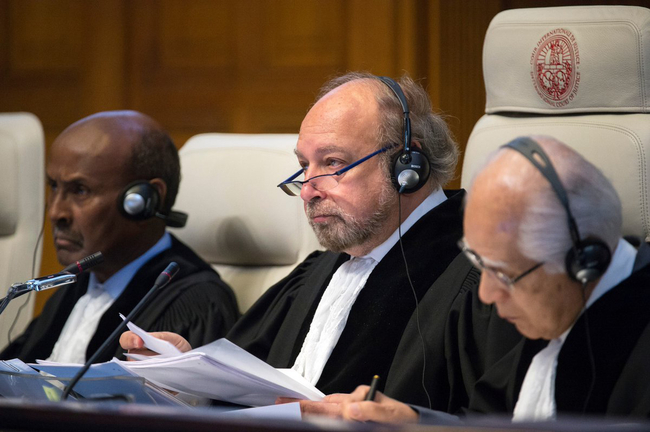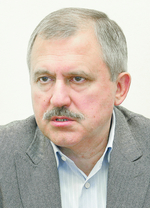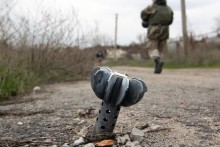The discussion sparked by the UN International Court of Justice (ICJ)’s ruling in the case Ukraine v. Russia is gaining momentum. One should be aware, however, that this ruling is not a decision on the merits, but rather on the provisional measures requested by Ukraine in its lawsuit. True to its style, the aggressor nation has already stated that “without a vote, the court determined Ukraine’s claims against Russia to be unfounded and, accordingly, the conditions for institution of provisional measures to be absent.” Ukrainians’ thoughts on the matter have been far more diverse. Firstly, what does the court’s ruling actually say?
Let us recall that the Ministry of Foreign Affairs (MFA) of Ukraine submitted to the ICJ in The Hague on January 16 a lawsuit alleging Russia’s violations of two UN Conventions, which deal with the suppression of the financing of terrorism and the elimination of all forms of racial discrimination. Ultimately, The Hague court rejected Ukraine’s request to indicate provisional measures against Russia under the Terrorism Financing Convention. However, the second part of the court’s ruling says that Russia must refrain from imposing limitations on the ability of the Crimean Tatar community to have its representative institutions, including the Mejlis, and ensure the availability of education in the Ukrainian language in Crimea. It also ordered Ukraine and Russia to work for the full implementation of the Minsk Agreements.
Ukrainian government officials have unanimously declared the ruling a victory for Ukraine. Specifically, the MFA’s response emphasizes the ruling concerning the elimination of racial discrimination, and clarifies the terrorist financing part as follows: “The court confirmed the existence of a dispute between Ukraine and Russia on the application of the Convention; the court acknowledged Ukraine’s compliance with the required pre-trial procedure; the court established prima facie jurisdiction over this dispute.” The MFA also emphasizes that by calling on the parties to implement the Minsk Agreements, the court has actually recognized Russia as a party to that process. “The next stage of the proceedings is consideration on the merits, during which Ukraine will submit all the necessary evidence to bring Russia to account for violations of its international legal obligations,” the statement reads.

INTERNATIONAL COURT OF JUSTICE. SITTING IN THE CASE UKRAINE V. RUSSIA / Photo from the Twitter page of the International Court of Justice
Should we expect Russia to comply with the UN court order to eliminate racial discrimination under provisional measures indicated in the Ukrainian lawsuit? “No, of course it will not do that,” Ukrainian presidential plenipotentiary for the Crimean Tatar affairs Mustafa Dzhemilev was quoted as saying by ru.krymr.com. “Nevertheless, the court ruling is very important. It definitely offers moral support for those Crimean Tatars who are being persecuted,” Dzhemilev added.
First deputy speaker of the Verkhovna Rada Iryna Herashchenko cited the MFA’s arguments and criticized the Facebook community: “The UN court is all over my Facebook feed. The dominant mood is traditional for the network’s Ukrainian segment: cursing, cries of betrayal, ‘all is lost,’ ‘bastards,’ ‘they submitted a lawsuit three years late,’ ‘they submitted a poorly drafted lawsuit,’ etc. Everything is as usual.” Of course, we should support decisions which benefit Ukraine and not cry betrayal where there is no reason to do so. But such cases, unfortunately, are few. In this case, there are both pluses and minuses, which are discussed below in the experts’ comments.
Earlier, lawyers noted that the Kremlin’s automatic recognition of The Hague court jurisdiction extended to two conventions only, which the government of Ukraine actually used. In other cases, Russia has the right to reject arbitration of that court. The problem is that Ukraine’s main claim against Russia should not be over discrimination or terrorism, but over its military aggression that has led to the capture of Crimea and parts of the Donbas. However, it should be noted that bringing Russia to justice over aggression is more difficult. Experts say that under the UN Charter, it is an exclusive responsibility of the Security Council, in which, as you know, Russia can block any decision. It is another matter altogether that the Ukrainian government has never officially recognized the state of war between Russia and Ukraine. We have never introduced martial law, but still operate under the anti-terrorist operation (ATO) regime. Moreover, while the Verkhovna Rada recognized Crimea as an occupied territory, it has not done so regarding the Donbas.
So, is the preliminary decision of The Hague court a victory or a defeat? Let us listen to the experts’ arguments.
“I WOULD DESCRIBE WHAT JUST HAPPENED AS THE MINSK DEAD END PART 3”
Andrii SENCHENKO, head of the Power of Law NGO, Ukraine’s 5th-6th-7th-convocation MP:
 “On the one hand, the UN ICJ decision is preliminary, but it sets the court on a certain course. In my opinion, this course is unfavorable for Ukraine. Under its Charter, the UN Court of Justice may adjudicate a dispute only when the parties agree to it. In this case, the countries that have ratified the relevant international conventions have accepted the UN ICJ’s jurisdiction as provided in the conventions themselves. This is why Ukraine sued Russia in the UN ICJ over terrorism financing and ethnicity-based harassment. In my opinion, however, a strategic mistake was made at this stage already. I tried several times to reach out to our leaders and tell them that we ought to submit the claim over the occupation of Crimea and the claim over Russia’s violations of the UN Charter as it unleashed the war against Ukraine as well. However, the position of our MFA, which is effectively the position of Petro Poroshenko, is that such lawsuits should not be submitted, because Russia would refuse to participate in their adjudication. Of course it would, but the very submission of such a lawsuit would indicate that Ukraine clearly sees all that happened as a violation by Russia of the UN Charter, rules governing international relations, etc. Secondly, had it happened, Russia would have confirmed that it is in the wrong by the very fact of refusal to participate. It had to be done, but was not done.
“On the one hand, the UN ICJ decision is preliminary, but it sets the court on a certain course. In my opinion, this course is unfavorable for Ukraine. Under its Charter, the UN Court of Justice may adjudicate a dispute only when the parties agree to it. In this case, the countries that have ratified the relevant international conventions have accepted the UN ICJ’s jurisdiction as provided in the conventions themselves. This is why Ukraine sued Russia in the UN ICJ over terrorism financing and ethnicity-based harassment. In my opinion, however, a strategic mistake was made at this stage already. I tried several times to reach out to our leaders and tell them that we ought to submit the claim over the occupation of Crimea and the claim over Russia’s violations of the UN Charter as it unleashed the war against Ukraine as well. However, the position of our MFA, which is effectively the position of Petro Poroshenko, is that such lawsuits should not be submitted, because Russia would refuse to participate in their adjudication. Of course it would, but the very submission of such a lawsuit would indicate that Ukraine clearly sees all that happened as a violation by Russia of the UN Charter, rules governing international relations, etc. Secondly, had it happened, Russia would have confirmed that it is in the wrong by the very fact of refusal to participate. It had to be done, but was not done.
“Furthermore, Poroshenko has been saying that we are conducting an ATO and has never recognized the actual state of war, which helps those who say that Ukraine has been involved in an internal conflict. This line of conduct has got us into another dead end. When the UN ICJ denied our request to institute terrorism financing-related protective measures against Russia, it did so because we are dealing with a war, and not terrorism financing. While Poroshenko deliberately imposes the ATO term on Ukrainians, he does not have this power in the West, and this leads to a lack of arguments. Overall, it looks like a major defeat.
“Another point concerns the UN ICJ mentioning the Minsk Agreements and urging Russia and Ukraine to implement them. This is surprising, because, again, the court can adjudicate without the consent of the parties only matters that were previously identified as belonging to the UN ICJ’s jurisdiction. The Minsk Agreements contain no consent of Russia and Ukraine that disputes connected with their implementation can be adjudicated in the UN court.
“I have a suspicion that it was the Ukrainian side that again emphasized the matter of the Minsk Agreements. Since some provisions of these agreements have failed to be passed by the Ukrainian Parliament, Poroshenko decided to push them through The Hague court. This will not lead to elections in the occupied territories, because our society will not let them do that. Still, there is a problem, because it will look like Ukraine does not comply with The Hague court’s order. There is another issue here. If the court went beyond the conventions dealing with the terrorism financing and ethnic cleansings and opted to issue an interim ruling requiring the parties to implement the Minsk Agreements, then why did the court not opt, for example, to issue a ruling that would oblige the guarantor nations to fulfill their duties under the Budapest Memorandum? I think this is because the lawsuit which Ukraine submitted to the ICJ either says nothing on this subject, or is much less insistent and less convincing about it than it is about calls to implement the Minsk Agreements. I would describe what just happened as the Minsk dead end Part 3.”
“#BETRAYAL OR #VICTORY, OR WHAT DID THE COURT SAY TRANSLATED INTO ORDINARY LANGUAGE”
Andrii PASICHNYK, Counselor of the Embassy of Ukraine in the US (facebook.com):
 1. “‘Both Parties shall refrain from any action which might aggravate the dispute,’ which means that Ukraine and Russia are prohibited from taking any action that could be considered a violation of the Conventions. This includes obligations under the Convention for the Suppression of the Financing of Terrorism (CFT) and the Convention on the Elimination of All Forms of Racial Discrimination (CERD).
1. “‘Both Parties shall refrain from any action which might aggravate the dispute,’ which means that Ukraine and Russia are prohibited from taking any action that could be considered a violation of the Conventions. This includes obligations under the Convention for the Suppression of the Financing of Terrorism (CFT) and the Convention on the Elimination of All Forms of Racial Discrimination (CERD).
2. “‘Both sides must implement the Minsk Agreements,’ which have ceasefire as their first provision. With the cessation of armed confrontation, the massive civilian casualties that are caused by illegal arms deliveries from Russia will automatically stop as well.
3. “‘Russia must refrain from maintaining or imposing limitations on the ability of the Crimean Tatar community to conserve its representative institutions, including the Mejlis.’ In this case, the court referred to the report of international observers who said that no puppet Crimean Tatar organization was either representative or legitimate. Now, Russia must think of ways to reactivate the Mejlis.
4. “‘Russia is obliged to restore the availability of education in the Ukrainian language in the Crimean peninsula.’ In this section, the court noted that the education in and of the Ukrainian language was disappearing in Crimea because of pressure exerted by the Russian authorities, which presented an imminent risk of irreparable harm to the rights of ethnic Ukrainians.
“Still, is it a #betrayal or #victory? It depends on how realistic one’s expectations were and the specific nature of this stage of the proceedings. It seems to have already become clear that the court does not have a military of its own, while international organizations that guarantee enforcement of the court’s decisions are sometimes slow to act. However, provisional measures have been indicated and additional obligations placed on Russia. Most importantly, Ukraine is currently the only nation that has managed to hold Russia responsible for its actions, and not by emulating that Russian diplomat who infamously screamed ‘Do not turn your eyes away!’ but rather by talking calmly and without excessive display of emotion. It also won that battle, even though it was not a knockout win. So, it clearly was a #victory.
► “P.S. Regarding the phantom #betrayal related to the CFT provisional measures, which is making rounds in the press, I can identify with reporters who are trying to get the news out as fast as they can, but the failure to indicate specific CFT-related provisional measures against Russia does not mean that no measures have been instituted. Every word matters in the court’s ruling, and a major international legal battle is being fought for every word. Since some of the court’s orders listed above are related to the CFT, I will not repeat myself. Therefore, #betrayal_ has_not_materialized.
► “P.P.S. What is next? The court will set out a procedural schedule, saying who submits what and when, as well as when further hearings will be held. Oral hearings will not restart for a year and a half or even two years, as we have moved into the stage of submitting written documents. Chronologically, Ukraine will have eight to ten months to submit its memorandum (that is, the statement of claim), most likely, Russia will put forward objections to jurisdiction, which would add another preliminary stage to the proceedings, as the court will consider and decide whether there is a dispute, whether the dispute concerns the Conventions, and whether the parties have complied with all the necessary pre-trial procedures. Georgia’s lawsuit against Russia failed at that stage. Today, as in the case of Georgia, the court found that there was prima facie evidence for a positive answer to all three questions. However, a detailed examination of this issue is still ahead. In fact, there is a battle being fought for every letter and every punctuation mark, both behind the scenes in the court and between the parties’ legal teams.”
“TURNING TO THE UN ICJ IS A TACTICAL MOVE. MEANWHILE, OUR STRATEGY SHOULD CENTER ON PREPARING A CONSOLIDATED CLAIM AGAINST RUSSIA AS THE AGGRESSOR NATION”
Volodymyr VASYLENKO, international lawyer, a judge of the International Criminal Tribunal for the former Yugoslavia (2002-05):
 “It is too early and inappropriate to describe the decision of the court as a victory or a defeat, since it is an interim ruling and not a decision on the merits, as well as because the UN ICJ makes legal decisions based on universally recognized norms of international law. This decision concerns only provisional measures designed to restrict further violations and prevent aggravation of the situation.
“It is too early and inappropriate to describe the decision of the court as a victory or a defeat, since it is an interim ruling and not a decision on the merits, as well as because the UN ICJ makes legal decisions based on universally recognized norms of international law. This decision concerns only provisional measures designed to restrict further violations and prevent aggravation of the situation.
“In general, I am positive about the UN ICJ’s ruling, because Russia urged the court to reject the request of Ukraine to indicate provisional measures. These provisional measures will in no way affect the further consideration on the merits. Ukraine will be able to provide additional evidence to substantiate its position. Personally, I anticipated the UN ICJ’s ruling to be something like this at this stage.
“In submitting this lawsuit, Ukraine set its aim high. Still, it is clear that reaching this aim requires serious work on strengthening our evidence.
“Now, is the UN ICJ’s ruling dangerous in that it allegedly recognizes Crimea as Russian, since the court’s order which is addressed to Russia effectively recognizes the Russian administration in the peninsula? I do not think that such a threat exists, because it is clear that the UN ICJ urges Russia to act as the occupying power, which has effective control over the occupied territories. As for the UN ICJ mentioning the Minsk Agreements, it is worth noting that the court simply drew the parties’ attention to the need to implement the Minsk Agreements, it did not impose a duty on the parties to implement them. These expectations do not affect the provisional measures part of the ruling.
“In 2008, Georgia submitted a lawsuit against Russia alleging violations of the CERD. Ukraine used its experience and benefited from it. However, Georgia applied directly to the UN ICJ, thus not complying with the Convention’s preconditions for exhausting all available means of peaceful settlement before applying to the ICJ. In particular, it had not proposed to hold negotiations with Russia. We must realize that the court does not consider the issue of aggression, but only those of violations of the Conventions.
“It should also be noted that drafting the consolidated lawsuit against Russia as the aggressor and occupier does not overlap with lawsuits over Russia’s violations of the abovementioned Conventions. Applications to international courts concern only individual violations of the Conventions. These are tactical moves. Meanwhile, our strategy should center on preparing a consolidated claim against Russia as the aggressor nation. This should be a solid, voluminous document. It should be drafted by a specially established coordinating body. No one agency can do it. This coordinating body or interagency commission should collect all the evidence showing that indeed, Russia has been committing aggression against Ukraine. It is necessary to legalize these testimonies, documents and other evidence. Then, we should calculate the damage that Russia caused to Ukraine. The calculations should include losses incurred by Ukraine due to this damage and losses incurred due to the liquidation of the damage. We must record all war crimes committed by the Russian side and indicate the Russian military personnel responsible for them. The losses which Russia should compensate should include the operating expenses of this commission itself. In this matter, we must engage with our Western partners who have introduced sanctions against Russia and have suffered losses as a result of these sanctions. This is an agreement with generally recognized principles of determining damages and appropriate compensation which an aggressor nation should pay.
“I emphasize that our Western partners should understand the danger posed by the behavior of Russia which is aimed at undermining the international legal order. At long last, an anti-Putin coalition should be created along the lines of the anti-Hitler coalition in order to avoid the consequences which resulted from attempts to appease Adolf Hitler once upon the time.”







